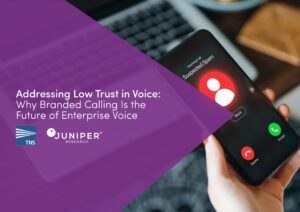Years of relentless robocalls have facilitated the erosion of trust in voice calling, as 68% of Americans refuse to answer calls from an unknown number. The inability to reach and engage with customers is creating unprecedented challenges for contact centers to engage with customers.
Despite these challenges, enterprises recognize that restoring trust in the voice channel is core to delivering a superior customer experience (CX). This requires a renewed focus on outbound CX technologies that deliver brand security and protection.
For businesses struggling to invest in the right outbound engagement strategies, Frost & Sullivan – a leading market research and consulting firm – has authored an Executive Brief with TNS that includes critical considerations and recommendations for contact center organizations looking to enhance their outbound capabilities.
Technology Advancements Can Refresh the Customer Experience
Frost & Sullivan’s current customer experience research focuses on the relationship between consumers and technology in an environment experiencing tremendous flux. In the competitive world of contact centers, IT decision-makers always seek advantages that enhance call agent productivity.
Cultivating successful outbound engagement strategies that drive great experiences and high customer loyalty are paramount for any successful contact center. Despite the continued challenges posed by spoofing and robocalls, the voice channel remains a necessary outbound customer engagement tactic.
What are the Challenges?
While contact centers in ‘high-touch’ industry verticals – i.e., financial services, healthcare, retail and hospitality – rely on voice calls to reach their customers, there are several significant challenges when it comes to engaging consumers via this channel. Three of the major ones include:
- Voice channel mistrust. Consumer confidence and trust in the voice channel are eroding due to spoofing and the constant deluge of unwanted (spam or fraud) robocalls.
- Unrecognized numbers. The overwhelming amount of robocalls has made consumers extremely reluctant to answer calls from unknown numbers.
- Low answer success rates (ASRs). Unanswered calls often lead to poor performance from contact center call agents, which promotes low contact center occupancy and wastes expensive agent talent on ignored and unanswered calls.
TNS Enterprise Authentication and Spoof Protection and TNS Enterprise Branded Calling Can Help Solve Industry Challenges
For the past decade, TNS has been developing and delivering robocall mitigation solutions for the telecom industry. TNS Enterprise Authentication and Spoof Protection enables enterprises to protect their reputation from spoofed calls by only allowing verified calls to reach the end consumer while restoring trust in the voice channel. With TNS Spoof Protection, unverified calls are immediately blocked.
TNS Enterprise Branded Calling, enables enterprises to label their outbound calls with rich call information – brand name and logo – so call recipients can better discern who is on the other end of the line.
A Next Practices Blueprint for Brand Authentication and Enterprise Branded Calling is available to download now.
Contact us to learn more about how TNS Enterprise Authentication and Spoof Protection and TNS Enterprise Branded Calling can improve contact centers’ outbound customer engagement.
Jim Tyrrell is Vice President of Enterprise Product Management at TNS with specific responsibility for TNS’ Communications Market solutions.
Contact Us
TNS Enterprise Branded Calling helps improve call answer and conversion rates, achieve better call durations and gives you a competitive advantage. Fill out this short form for more information from a TNS representative about how branded caller ID can help you and your business succeed.






